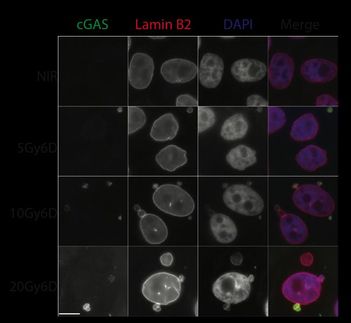UC San Diego researchers reverse pulmonary arterial hypertension in mouse models
Researchers at the University of California, San Diego, have identified a key protein that promotes the development of pulmonary arterial hypertension in humans and mice. This groundbreaking discovery has implications for future drug therapies that may extend the life of patients with pulmonary arterial hypertension and prevent the need for lung transplantation, currently the only cure for this debilitating disease.
In a paper published in Nature Medicine, Patricia Thistlethwaite, MD, PhD, Professor of Surgery and cardiothoracic surgeon in UCSD's Department of Surgery, and colleagues describe the genetic pathway by which vascular smooth muscle cells associated with pulmonary arterial hypertension are switched on to proliferate by a receptor protein called Notch-3. With this finding, the researchers were able to block and reverse the pathway of disease in mice.
"The UCSD team found that pulmonary hypertension is characterized by overexpression of Notch-3 and that the severity of the disease correlates with the amount of this protein in the lung," said Thistelthwaite. "We showed that a mouse model lacking this protein does not develop pulmonary hypertension, and in addition, that the disease can be effectively treated with an enzyme called gamma-secretase inhibitor, which blocks Notch-3 activation."
In Thistlethwaite's laboratory, mice with pulmonary arterial hypertension that were treated with the gamma-secretase inhibitor showed reversal of the disease. Forms of this drug are currently in use in Phase 1 trials for the treatment of Alzheimer's disease.
Most read news
Topics
Organizations
Other news from the department science

Get the life science industry in your inbox
By submitting this form you agree that LUMITOS AG will send you the newsletter(s) selected above by email. Your data will not be passed on to third parties. Your data will be stored and processed in accordance with our data protection regulations. LUMITOS may contact you by email for the purpose of advertising or market and opinion surveys. You can revoke your consent at any time without giving reasons to LUMITOS AG, Ernst-Augustin-Str. 2, 12489 Berlin, Germany or by e-mail at revoke@lumitos.com with effect for the future. In addition, each email contains a link to unsubscribe from the corresponding newsletter.
More news from our other portals
Last viewed contents
Engineered protein-like molecule protects cells against HIV infection
Abbott Wins Two Scrip Awards Recognizing Excellence in Pharmaceutical and Biotech Industries
Reproductive_health
Actavis divests its distribution business in Bulgaria
John_Dix_Fisher
Echis_megalocephalus
Organon Involved in Unique Initiative for the Development and Production of Biopharmaceutical Medicines

Soil bacteria as biocatalysts - Researchers have clarified the molecular structure of an enzyme class, enabling them to use bacteria to produce prodrugs
Galapagos and Arthrogen enter target discovery alliance






















































